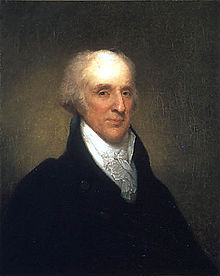Horatio Gates Armstrong
Horatio Gates Armstrong | |
|---|---|
| Born | June 1, 1790 Red Hook, New York, U.S. |
| Died | April 6, 1858 (aged 67) Baltimore, Maryland, U.S. |
| Allegiance | |
| Service | |
| Years of service | 1812–1813 (U.S. Army) |
| Rank | Major (U.S. Army) |
| Battles / wars | War of 1812 |
| Spouse(s) |
Mary Hughes (m. 1814) |
| Children | 3 |
| Relations |
|
Horatio Gates Armstrong (June 1, 1790 – April 6, 1858)[1] was an American soldier who fought in the War of 1812.
Early life and career
[edit]
Armstrong was born on June 1, 1790, and was named after General Horatio Gates, whom his father had been aide to during the American Revolutionary War.[2][3] He was the eldest of seven children born to John Armstrong Jr. and Alida (née Livingston) Armstrong (1761–1822), who married in 1789.[4][5] His father served as a Continental Congressman, a U.S. Senator, U.S. Secretary of War, U.S. Minister to France.[6]
Among his siblings was Henry Beekman Armstrong, also a soldier in the War of 1812;[7] John Armstrong III, who became a gentleman farmer at La Bergerie; Robert Livingston Armstrong;[8] Margaret Rebecca Armstrong (who married William Backhouse Astor Sr.);[9][10] James Kosciuszko Armstrong and William Armstrong.[11]
His paternal grandparents were General John Armstrong and Rebecca (née Lyon) Armstrong.[12] Among his Armstrong family, who were of "distinguished Scottish descent,"[13] was uncle James Armstrong, a physician who became a U.S. Congressman.[4] His paternal grandparents were Judge Robert Livingston and Margaret (née Beekman) Livingston. Among his Livingston family members were uncles Chancellor Robert R. Livingston and Edward Livingston.[11][10]
During the War of 1812, Armstrong fought on the American side, heading a company known as the Capt. Horatio G. Armstrong Co. with the 23rd Regiment Infantry.[14] He was eventually promoted to Major.[15]
Personal life
[edit]In 1814, Armstrong was married to Baltimore native Mary Hughes (1791–1866).[16] Mary was the youngest daughter of Margaret (née Sanderson) Hughes and Christopher Hughes, a banker and investor in real estate originally from County Wexford, Ireland. Among her siblings was older brother, Christopher Hughes (who served as the U.S. Minister to Sweden and the Netherlands),[17] and older sister Louisa Hughes (the wife of George Armistead).[18] Together they had three children:
- John Horatio Armstrong (1815–1886),[19] who married Caroline Amelia Scheldt (1828–1912) in 1844.[20][21]
- Margaret Hughes Armstrong (1817–1870)
- Christopher Hughes Armstrong (1821–1884)
Armstrong died at his residence near Baltimore on April 6, 1858.[1] His widow was the administratrix of his estate.[22]
References
[edit]- ^ a b "DIED". The Daily Exchange. 9 Apr 1858. p. 2. Retrieved 5 June 2019.
- ^ Tucker, Spencer (2009). U.S. Leadership in Wartime: Clashes, Controversy, and Compromise. ABC-CLIO. ISBN 9781598841725. Retrieved 10 August 2017.
- ^ Bartoloni-Tuazon, Kathleen (2014). For Fear of an Elective King: George Washington and the Presidential Title Controversy of 1789. Cornell University Press. p. 48. ISBN 9780801471919. Retrieved 5 June 2019.
- ^ a b Skeen, Carl Edward (1981). John Armstrong, Jr., 1758-1843: A Biography. Syracuse, N.Y.: Syracuse University Press. ISBN 9780815622420. Retrieved 10 August 2017.
- ^ "John Armstrong letters 1795, 1802, 1806, 1812, 1813, 1814". archives.nypl.org. The New York Public Library. Archived from the original on 18 October 2019. Retrieved 10 August 2017.
- ^ "ARMSTRONG, John, Jr. - Biographical Information". bioguide.congress.gov. Biographical Directory of the United States Congress. Retrieved 10 August 2017.
- ^ Chisholm, Hugh (1905). The Encyclopaedia Britannica: A Dictionary of Arts, Sciences, Literature and General Information. Cambridge University Press. Retrieved 10 August 2017.
- ^ Heitman, Francis Bernard (1903). Historical Register and Dictionary of the United States Army: From Its Organization, September 29, 1789, to March 2, 1903. U.S. Government Printing Office. p. 170. Retrieved 10 August 2017.
- ^ Trager, James (2010). The New York Chronology: The Ultimate Compendium of Events, People, and Anecdotes from the Dutch to the Present. Zondervan. ISBN 9780062018601. Retrieved 10 August 2017.
- ^ a b Mowbray, Jay Henry (1898). Representative Men of New York: A Record of Their Achievements. New York Press. Retrieved 10 August 2017.
- ^ a b Livingston, Edwin Brockholst (1910). The Livingstons of Livingston Manor: Being the History of that Branch of the Scottish House of Callendar which Settled in the English Province of New York During the Reign of Charles the Second; and Also Including an Account of Robert Livingston of Albany, "The Nephew," a Settler in the Same Province and His Principal Descendants. Knickerbocker Press. Retrieved 10 August 2017.
- ^ Who Was Who in American History - the Military. Chicago: Marquis Who's Who. 1975. p. 15. ISBN 0837932017.
- ^ Reynolds, Cuyler (1914). Genealogical and Family History of Southern New York and the Hudson River Valley: A Record of the Achievements of Her People in the Making of a Commonwealth and the Building of a Nation. Lewis Historical Publishing Company. p. 1262. Retrieved 5 June 2019.
- ^ "War of 1812 Discharge Certificates". www.archives.gov. National Archives. 15 August 2016. Retrieved 5 June 2019.
- ^ Journal of the Senate of the United States of America. U.S. Government Printing Office. 1812. p. 371. Retrieved 5 June 2019.
- ^ "ARMSTRONG". The Baltimore Sun. 8 Feb 1866. p. 2. Retrieved 5 June 2019.
- ^ Nolan, Cathal J. (1997). Notable U.S. Ambassadors Since 1775: A Biographical Dictionary. Greenwood Publishing Group. p. 176. ISBN 9780313291951. Retrieved 5 June 2019.
- ^ Kennedy, Mary Selden (1911). Seldens of Virginia and Allied Families. Frank Allaben Genealogical Company. p. 186. Retrieved 5 June 2019.
- ^ "ARMSTRONG". The Baltimore Sun. 19 Oct 1886. p. 2. Retrieved 5 June 2019.
- ^ Lineage Book - National Society of the Daughters of the American Revolution. Daughters of the American Revolution. 1907. p. 5. Retrieved 5 June 2019.
- ^ "HORATIO G. ARMSTRONG". The Boston Globe. 31 Jan 1929. p. 12. Retrieved 5 June 2019.
- ^ "Legal Notices". The Daily Exchange. 13 Jul 1858. p. 1. Retrieved 5 June 2019.
